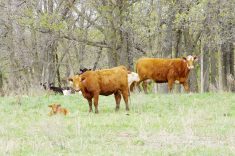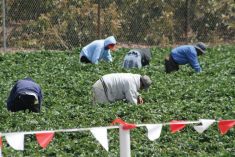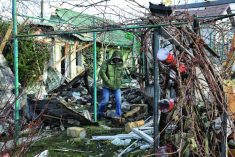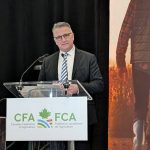Returning to her family’s bison farm inspired Anna Kuelken to make a film.
And that 17-minute documentary, “Father Like Son,” won her a national art prize and a cheque for $15,000. But more importantly, it gave the young filmmaker a chance to celebrate both her family and the way of life that they, and so many others, have chosen.
“Just moving home was the inspiration,” said Kuelken, who had been studying filmmaking at the Nova Scotia College of Art and Design when COVID-19 arrived.
“I moved back to the farm for the pandemic and watched my niece and nephew with my brother and it reminded me of myself. I was trying to find my roots again.
“My family really inspires me. My storytelling begins at the farm, so it felt really natural.”
While filming daily activities on the farm near Fort Assiniboine (northwest of Barrhead), she was captivated by how her brother had incorporated his children into his rural life.
“I wanted to focus on my niece and nephew, who are slowly learning the things I did as a child, including the hard ones,” Kuelken writes in an intro to her work.
Early in the film, viewers meet her seven-year-old niece, who says she wants to be a farmer, partly because she likes animals.
But then things take a turn. A bison with a broken leg is killed and then butchered. The film shows the young girl crying and being gently comforted, and slowly becoming curious. Then she shyly begins helping with the skinning and later her and her brother help as the meat is being ground and packaged.
“My niece and nephew were not actually supposed to be there when we were butchering the bison,” she said. “Originally, she’s very upset about it, but then she starts helping and she’s part of the whole thing.”
Those scenes — understated, almost melancholy but clearly loving — “kind of set the tone on how to structure (the film) and how to create it for the audience, so that was kind of interesting,” she said.
Kuelken “roamed around with my camera” during last winter to create a portrait of her family in their everyday lives, whether dealing with bison in a pen or working in the oilfield service company that her brother and father operate.
“It does touch on broader subjects in a subtle way — like how farmers have to take off-farm jobs to support their family unless they get to the big agribusiness model.”
In voiceovers, her father and brother talk about things such as why they farm, why they work in the oilpatch to support the operation, and the joy that the farm brings.
“I’m thankful I’m able to live here, raise my family here, see my grandchildren grow up here,” her father says in a voiceover in the opening scene, which shows him heading out the door into the yard and the early-morning light.

Kuelken, who also studied design at MacEwan University and has a background in illustration and photography, graduated from Nova Scotia College of Art and Design earlier this year. One of her teachers from the college submitted her film for the BMO 1st ART! award, a two-decade-old competition that “celebrates the creativity of art school students” from across the country. Her film was chosen from 336 submissions.
When asked about the title, Kuelken said, “My dad bought the farm off his dad. My brother is trying to do the same kind of thing.”
She was also aware of watching her nephew and niece go through the same cycles she and her brother went through, and feeling nostalgic about her childhood on the farm. The farm has been in the family for 70 years, and the Kuelkens currently grow hay and clover to feed the bison.
“I think my inspiration — and what I want to do more about — has to do with agriculture and horticulture and connection to the land. I think it’s very important, and we, as a society, have lost a lot of that. That’s where my next journey will take me.”
The prize money will be used to pay down student debt, and buy filmmaking equipment. Kuelken’s film can be viewed online.

















